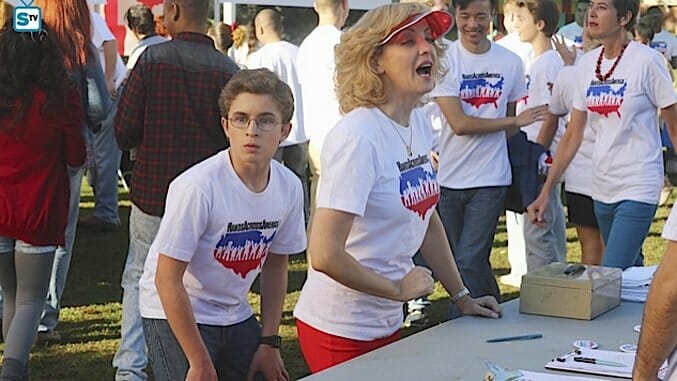Introducing Endless Mode: A New Games & Anime Site from Paste
In theory, the worst thing that can happen to a TV comedy (aside from it failing to be funny) is when it stops being surprising. There are countless theories and philosophies about what exactly makes something funny, but there’s usually one element, or variation therein, that they all seem to share: “funny equals the unexpected.” Needless to say, when one is required to produce twenty plus episodes of TV year-after-year, your ability to bring something new to the table becomes more and more difficult. I consider shows like Cheers and Parks and Recreation to be among the most consistently great sitcoms ever produced, but even they begin to feel a bit stale going into their later years.
The Goldbergs currently stands in a strange limbo. It’s still a relatively young show, but—now in its third season—it’s beginning to reach middle age, a time when it becomes much easier for a series to coast on good will and the talents of its cast. It’s reassuring, then, when episodes like “Baio and Switch” come around. I’ll admit that when I first realized one of the episode’s main premises—after agreeing to accompany his friend Emmy to the dance, Adam inadvertently finds himself with two dates when girlfriend Dana unexpectedly returns—I grew a bit concerned. Luckily, the show itself recognizes what a cliché, sitcom-y trope this storyline is and plays off the fact that it never once has worked out. Indeed, when Adam tries to peruse the great sitcoms of the past (Brady Bunch, Family Ties, Cheers) for potential advice, he only finds discouragement.
Bolstered by words from Pops (who actually pulled off the feat during a USO show), Adam sets into place a fairly comprehensive plan. In another nice twist, however, Emmy and Dana end up discovering his deceit simply by communicating with one another—because, you know, they do know each other and that was bound to come out. Adam is distraught but, following advice from his father to—what else—not be a moron, he apologizes to his lady friends and they end up attending the dance together. Adam even manages to set Emmy up with her crush. It’s a cute story that cleverly subverts the familiar and makes the story its own.
The titular plotline also carries a sitcom connection, as it centers on the presence (or lack thereof) of TV heartthrob Scott Baio. When Beverly again finds herself jealous of the Kremps (you’d think after a few episodes with the same launching point, Beverly would remember that the family isn’t as perfect as they appear), she signs up as a coordinator for the Hands Across America charity event. Her motive? Secure a front page newspaper photo of the Goldberg clan holding hands for a great cause as proof that they are more than a family that screams at each other. Sensing danger, her children immediately try to pull out of the event, but she coaxes them back in with the promise that Baio will be at the event (at this point, one feels as though they should be more suspicious of such statements). This white lie goes over about as well as planned, with Erica, Barry and several of their school chums fighting over who will get to hold Baio’s hand at the event. Unable to produce Baio in time, Beverly offers up a Benjamin Franklin impersonator as an alternative. This revelation causes a ruckus and the family’s in-fighting results in their section of the “Hands” line being left open. As Beverly hoped, they do end up on the front page of the local paper, except under the headline “Loud Family Breaks American Chain.” Ultimately, Erica and Barry present the photo to their mother as an item of endearment. Sure, they are a family that fights and yells at each other, but it all comes from a place of love.
Again, the actual plotline serves as a variation of several that have come before it, but the section really benefits from Erica and Barry quarreling, which is always a nonstop well of amusement. Particularly notable is when the two wage a brief war to prove which one of them loves Beverly more (ostensibly, to secure a spot next to Baio). Barry wins by offering to build a special area of his future house just for his mother, quickly realizes he’s gone too far with the promises, but then quickly rebounds and proclaims, “future Barry’s problem.” Actor Troy Gentile is seriously starting to match Arrested Development’s Will Arnett in the “comedically veering between opposing emotions” front.
Here it’s probably worth mentioning that this will be the last time I submit a weekly recap of The Goldbergs. It’s been an interesting journey watching the show develop from a promising, if scrappy young sitcom, to one of the last remaining network success stories. When the only complaint you can muster about recapping a show is that it become so consistently good and, therefore, difficult to write about—well, you have a pretty great job there. I wish nothing but the best for Adam F. Goldberg (who often gracefully accepted any criticisms of his show I had), his creative team and the ridiculously talented cast. Here’s hoping the show has a nice, long run. I know I’ll be watching and laughing.
Cheers to 1980-something!
Mark Rozeman is a Los Angeles-based freelance writer and regular contributor to Paste
. You can follow him on Twitter.